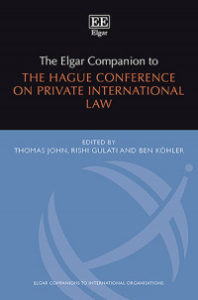Views
Nothing Found
Sorry, no posts matched your criteria
News
Book V-Launch: Elgar Companion to the HCCH
Join us on 15 December 2020 at 12 noon (The Hague) for the launch of the Elgar Companion to the Hague Conference on Private International Law, edited by Thomas John, Rishi Gulati and Ben Köhler.
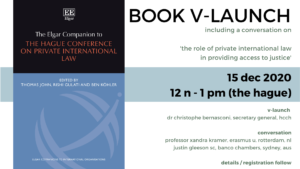
The book will be launched by Christophe Bernasconi, Secretary General of the HCCH, and is followed by a conversation and Q&A on a key theme that emerged in the Companion: the importance of private international law to providing access to justice. The speakers are:
- Professor Xandra Kramer, Erasmus University, and Deputy Judge, District Court, Rotterdam, NL
- Justin Gleeson SC, Barrister and Arbitrator, Banco Chambers, Sydney, AUS
Register here: https://lnkd.in/d7cyVF4.
The Companion is a unique guide to the HCCH. 35 leading international experts contributed to this work. Their contributions offer a unique critical assessment of, and reflection on, past and possible future contributions of the HCCH to the further development and unification of private international law.
For more information on the book, including endorsements by Lord Collins, Professor Basedow, Professor Silberman, Justice de Nardi, Professor Neels and Professor Reyes, click here.
HCCH Update: Upcoming Online Events and Webinars
HCCH a|Bridged – Edition 2020: Golden Anniversary of the HCCH 1970 Evidence Convention
Tuesday 2 December 2020, 14:15 CET
Registration | Programme | Event Website | HCCH Evidence Section
(Registration closes 17:00 CET Friday 27 November)
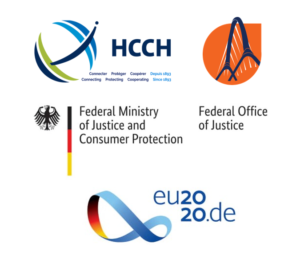 Building upon the success of HCCH a|Bridged – Edition 2019, this year’s edition will focus on the Evidence Convention. Edition 2020 will ensure the event remains true to its name, being short and sharp. Following a keynote speech from Professor Dr Michael Stürner entitled “50 years of the HCCH Evidence Convention – Facilitating cross-border proceedings”, the first panel will discuss the topic “Effective Taking of Evidence under Chapter I of the Convention: A Requesting State’s Perspective”, after which the second panel will consider challenges and opportunities relating to the “Taking of Evidence under Chapter II of the Convention”. The HCCH will be represented by Secretary General Dr Christophe Bernasconi, First Secretary Dr João Ribeiro-Bidaoui, and Legal Officer Ms Elizabeth Zorrilla.
Building upon the success of HCCH a|Bridged – Edition 2019, this year’s edition will focus on the Evidence Convention. Edition 2020 will ensure the event remains true to its name, being short and sharp. Following a keynote speech from Professor Dr Michael Stürner entitled “50 years of the HCCH Evidence Convention – Facilitating cross-border proceedings”, the first panel will discuss the topic “Effective Taking of Evidence under Chapter I of the Convention: A Requesting State’s Perspective”, after which the second panel will consider challenges and opportunities relating to the “Taking of Evidence under Chapter II of the Convention”. The HCCH will be represented by Secretary General Dr Christophe Bernasconi, First Secretary Dr João Ribeiro-Bidaoui, and Legal Officer Ms Elizabeth Zorrilla.
Conferencia internacional: Convención HCCH 2019 sobre Reconocimiento y Ejecución de Sentencias Extranjeras
Thursday 3 December 2020, 15:00 CET (11:00 local)
Registration | Programme | Event Website | HCCH Judgments Section
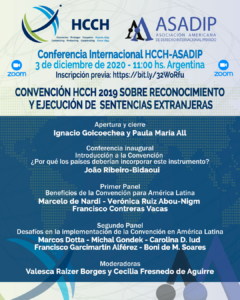 This Spanish-language international conference, co-hosted by ASADIP and the HCCH will, as its name suggests, be devoted to the HCCH 2019 Judgments Convention. The programme will cover an introduction to the Convention and the reasons why States should join, a presentation of the particular benefits of the Convention for Latin America, as well as a discussion of the implementation challenges for States in the region. The HCCH will be represented by First Secretary Dr João Ribeiro-Bidaoui and Representative for Latin America and the Caribbean Mr Ignacio Goicoechea. They will be joined by many other experts, a number of whom were involved in the negotiation of the Convention, including Explanatory Report Co-Rapporteur Professor Francisco Garcimartín.
This Spanish-language international conference, co-hosted by ASADIP and the HCCH will, as its name suggests, be devoted to the HCCH 2019 Judgments Convention. The programme will cover an introduction to the Convention and the reasons why States should join, a presentation of the particular benefits of the Convention for Latin America, as well as a discussion of the implementation challenges for States in the region. The HCCH will be represented by First Secretary Dr João Ribeiro-Bidaoui and Representative for Latin America and the Caribbean Mr Ignacio Goicoechea. They will be joined by many other experts, a number of whom were involved in the negotiation of the Convention, including Explanatory Report Co-Rapporteur Professor Francisco Garcimartín.
Book Launch: Elgar Companion on the Hague Conference on Private International Law
Tuesday 15 December 2020, 12:00 CET
Registration & Programme | Elgar Companion
This post is published by the Permanent Bureau of the Hague Conference of Private International Law (HCCH).
RIDOC 2020 Programme Announced
RIDOC 2020: Rijeka Doctoral Conference is particularly international this year both, with regard to the attending doctoral candidates and in relation to the composition of the panels. Thirty-four selected doctoral candidates will be testing their research hypothesis and methodologies in six sessions each presided by a three-member panel.
No less than two sessions might be of particular interest to this Blog’s readers:
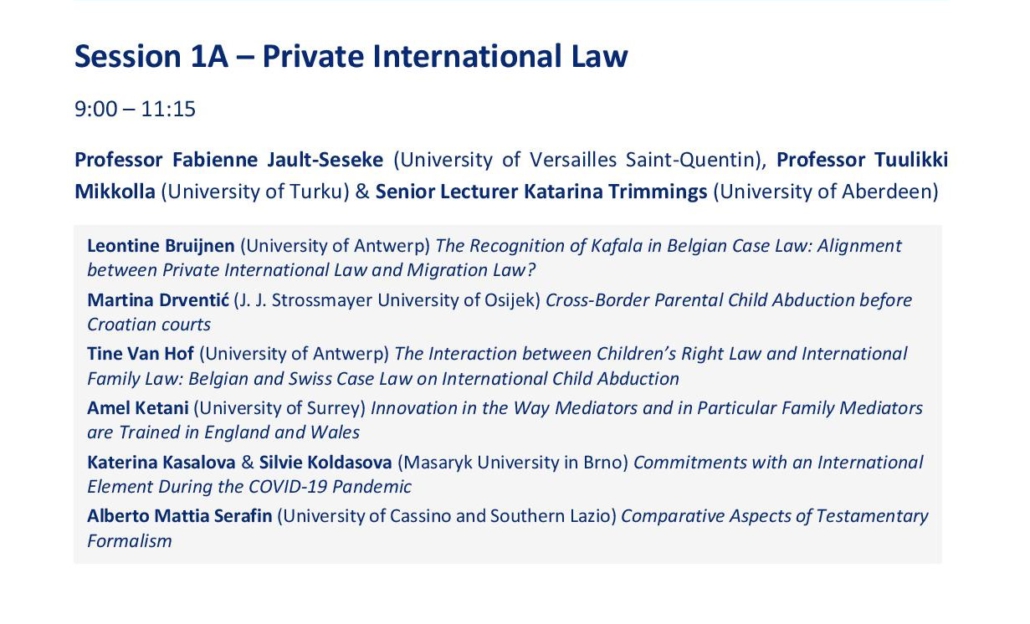
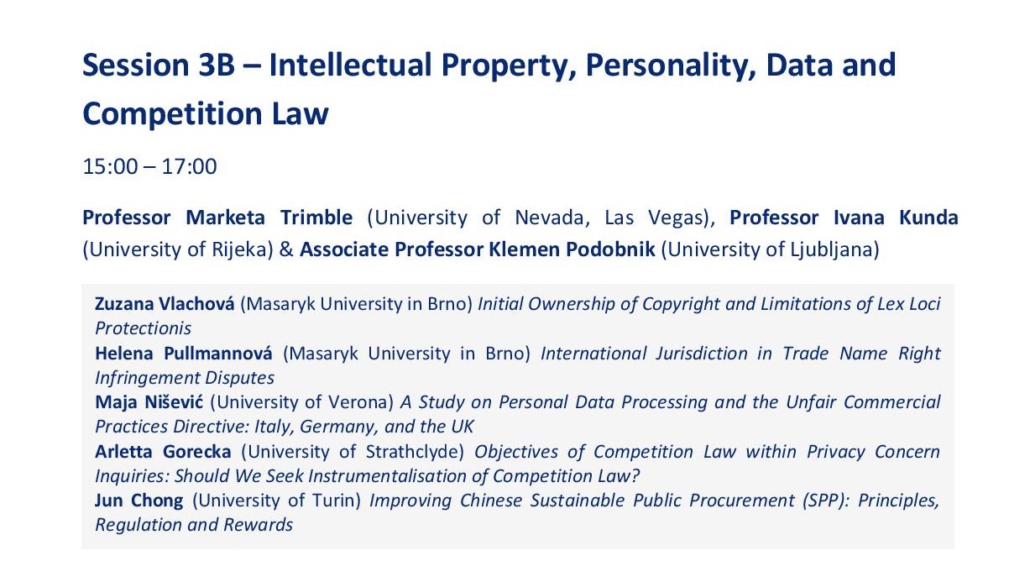
The keynote lecture will be delivered by Professor Carlo Rimini, affiliated with University of Milano and University of Pavia, a recognised family law researcher and attorney. He will be speaking about validity of the prenuptial agreements from the methodology perspective.
Full programme is available here, and additional information may be obtained at ridoc@pravri.hr.
The entire conference will be online at the Cisco Webex platform. Attendance is free on the first-to-apply bases, but registration is necessary via this link.



